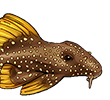Breeding Plecos. Substrate vs. Barebottom
Breeding Plecos. Substrate vs. Barebottom
I was curious of everyones opinions on whether to breed and raise pleco fry in a bare bottom tank or one with substrate. Please post all opinions.
Thanks,
Pat
Thanks,
Pat
-
andywoolloo
- Posts: 2751
- Joined: 02 Dec 2007, 02:55
- I've donated: $100.00!
- My cats species list: 12 (i:0, k:0)
- My aquaria list: 1 (i:1)
- Location 2: Sanger, California
Re: Breeding Plecos. Substrate vs. Barebottom
I've only raised Bristlenose fry so far, and I , and I think they, prefer sandy bottom. They like to dig in it and blend into it. It's not hard to clean I do not think.
Plus I have read about on here about bio film on the bare bottom being not good for the fry of pl*co and or cory. But some people do bare bottom.
Plus when you weigh down there fruit and veg the substrate gives it something to hold onto rather then have the adults push it all over the tank. Just my opinions.
Plus I have read about on here about bio film on the bare bottom being not good for the fry of pl*co and or cory. But some people do bare bottom.
Plus when you weigh down there fruit and veg the substrate gives it something to hold onto rather then have the adults push it all over the tank. Just my opinions.
Re: Breeding Plecos. Substrate vs. Barebottom
Ive read a few posts about the bio film concern in a BB tank. My question is... Wouldnt any tank have bio film on all of the surfaces whether it be sand, gravel, wood, or glass?
Thanks,
Pat
Thanks,
Pat
- krazyGeoff
- Posts: 764
- Joined: 16 Nov 2007, 06:03
- I've donated: $110.00!
- My articles: 2
- My images: 12
- My cats species list: 27 (i:1, k:0)
- My aquaria list: 6 (i:3)
- My BLogs: 7 (i:7, p:365)
- Spotted: 7
- Location 1: Woodville
- Location 2: New Zealand
- Interests: Fish and Cats
Re: Breeding Plecos. Substrate vs. Barebottom
Hi Pat,
I think it comes down to personal preference.
I raised BN fry for 2 years, and I mean thousands of them, with bare bottomed tanks. Easier to clean, you can see left over food, and you get a better idea of how many fish are in each tank. Say for arguments sake I was getting a 20-30% death rate.
Then after a couple of tank movements, with a resulting 100% loss I went for a substrate bottom. Some have really fine substrate some have it a bit more coarse. Its harder to clean, harder to see the left over food, harder to determine how many juveniles are in any one tank, but my losses have reduced to <5%.
For me I will continue to use substrate. For my other plec fry I always have substrate after they move out of the hatchery.
I also believe that there is a fair amount of nitrifying bacteria in the substrate.
Basically it works better for me.
Cheers
Geoff
I think it comes down to personal preference.
I raised BN fry for 2 years, and I mean thousands of them, with bare bottomed tanks. Easier to clean, you can see left over food, and you get a better idea of how many fish are in each tank. Say for arguments sake I was getting a 20-30% death rate.
Then after a couple of tank movements, with a resulting 100% loss I went for a substrate bottom. Some have really fine substrate some have it a bit more coarse. Its harder to clean, harder to see the left over food, harder to determine how many juveniles are in any one tank, but my losses have reduced to <5%.
For me I will continue to use substrate. For my other plec fry I always have substrate after they move out of the hatchery.
I also believe that there is a fair amount of nitrifying bacteria in the substrate.
Basically it works better for me.
Cheers
Geoff
- MatsP
- Posts: 21038
- Joined: 06 Oct 2004, 13:58
- My articles: 4
- My images: 28
- My cats species list: 117 (i:33, k:0)
- My aquaria list: 10 (i:8)
- My BLogs: 4 (i:0, p:164)
- Spotted: 187
- Location 1: North of Cambridge
- Location 2: England.
Re: Breeding Plecos. Substrate vs. Barebottom
There will be some sort of bio-film in any tank. However, the surface area of a bare-bottom tank is fairly small, compared to the surface area of a few millimeter of sand/fine gravel, where each grain has some surface area exposed (usually only a tiny bit unexposed). Since the bacteria in this bio-film is dependent (or a function of) on the amount of "food" (mainly fish-waste, really), the amount of bio-film is a constant for the size of the tank. However, the surface area varies greatly between "bare-bottom" (low surface area) and a fine substrate (high surface area).
I've heard a few people promote bare-bottom with a "wipe every day" approach, but most people that I know of as experienced breeders prefer sand/gravel substrate over bare-bottom.
--
Mats
I've heard a few people promote bare-bottom with a "wipe every day" approach, but most people that I know of as experienced breeders prefer sand/gravel substrate over bare-bottom.
--
Mats
-
bronzefry
- Posts: 2198
- Joined: 31 Aug 2004, 16:01
- I've donated: $100.00!
- My articles: 6
- My images: 12
- My cats species list: 17 (i:0, k:0)
- My aquaria list: 7 (i:7)
- Spotted: 6
- Location 1: Sharon, Massachusetts, US
Re: Breeding Plecos. Substrate vs. Barebottom
Personal preference, 100%! 
In grow out tanks, I use a "modified" bare bottom for some: a little bit of substrate for the babies to play with and chew on. Or, in case I go away and need to miss a feeding, there's biofilm for them. Some species seem to prefer this more than others. The species that like to gnaw and chew a lot like this. Ancistrus, Peckoltia-type species, etc. Corydoras, bare-bottom for their grow-out and clean it a lot. Or else they seem to keel over and die. Just my experience.
For the adults, I use substrate and plants when applicable. If the species is rambunctious, I use floating plants.
Amanda
In grow out tanks, I use a "modified" bare bottom for some: a little bit of substrate for the babies to play with and chew on. Or, in case I go away and need to miss a feeding, there's biofilm for them. Some species seem to prefer this more than others. The species that like to gnaw and chew a lot like this. Ancistrus, Peckoltia-type species, etc. Corydoras, bare-bottom for their grow-out and clean it a lot. Or else they seem to keel over and die. Just my experience.
For the adults, I use substrate and plants when applicable. If the species is rambunctious, I use floating plants.
Amanda




